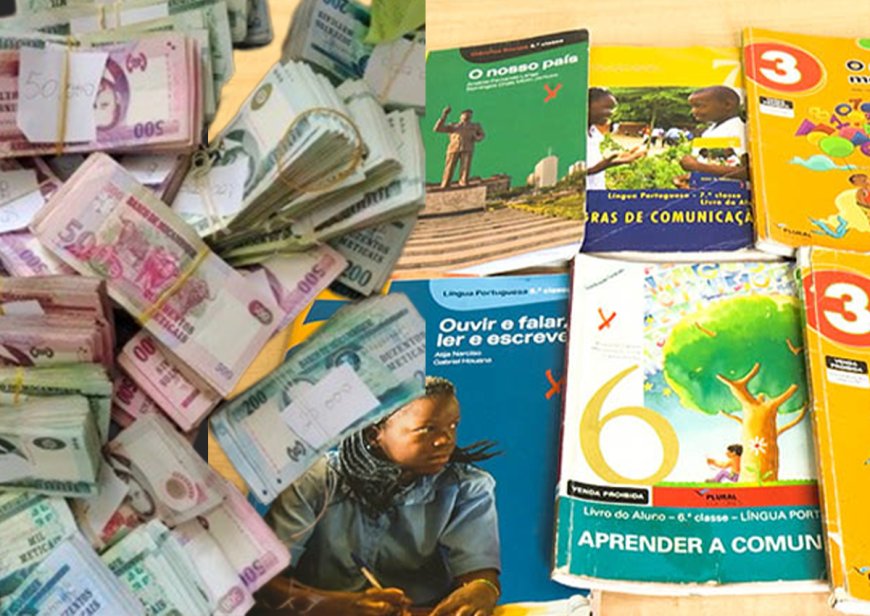Mozambique's Education Ministry under fire for costly, ineffective textbook rollout
The decision by the Ministry of Education and Human Development (MINEDH) to distribute textbooks for 1st and 2nd grade students from July 2024 has sparked a chorus of criticism and discontent among teachers and school directors in both public and private institutions.

The National Organisation of Teachers (ONP) expressed its indignation over the delay in the distribution of textbooks for the first grades of primary education in Mozambique, with the delivery now scheduled for July 2024.
According to teachers, this late action compromises the effectiveness of teaching, suggesting that the books should be stored for the next academic year, thus avoiding a waste of resources and effort.
"Distributing textbooks at this time of year, to be used for only two or three months, is pointless. It would make more sense to save them for the next academic year," argued Teodoro Muidumbe, the General Secretary of ONP, in an exclusive statement to TORRE.News.
Muidumbe also criticised the lack of communication from the Ministry of Education and Human Development (MINEDH) regarding the changes in the book delivery schedule.
Hortência Josine, the Pedagogical Director of 25 de Setembro Primary School in Maputo, shared a similar perspective, reinforcing the widespread dissatisfaction.
“It makes no sense to distribute the books now. The children will only use a small part of them, which is a clear waste,” Josine said, highlighting that the best solution would be to store the books to ensure their full use next year.
Teachers argue that the delay in the arrival of the books, which were initially scheduled for the start of the school year, undermines the continuity of the educational process. So far, schools have been relying on teaching materials from previous years and worksheets prepared by the teachers themselves to keep the lessons going.
Although this approach is functional, it does not replace the need for proper textbooks that provide more structured and effective teaching.
In response to the crisis, the government introduced “Activity Notebooks,” a temporary solution that combines Portuguese and Mathematics subjects.
However, these notebooks are only available for the second grade, following the withdrawal of all first-grade copies due to serious errors. The spokesperson for MINEDH denied that the creation of these notebooks was a contingency measure in response to the delay in book delivery, claiming that it was a pre-planned action.
Private schools are also struggling due to the lack of access to the new books and activity notebooks.
José Marrengula, the Pedagogical Director of a private school in Maputo, noted that the absence of updated material forces institutions to resort to outdated resources and supplementary worksheets, a solution he considers unsatisfactory and temporary.
"The material [books] was designed for the whole year, so if it is distributed now to be used for only two or three months, it is not being put to good use," said Marrengula.
He argued that when the books arrive, they should be stored for the next academic year to ensure they are used to their full potential.
The financial impact of this situation is another point of controversy. The cost of producing the books, financed by the government with support from the World Bank, is seen as a waste if the books are not fully utilised.
The lack of clarity and effective planning by MINEDH has generated criticism and raised concerns about fund management and the efficiency of educational policies.
TORRE.News attempted to obtain a comment from MINEDH on the costs involved and the book distribution strategy, but had not received a response by the time of publication.
Information obtained by the newspaper “O País” indicates that the World Bank, through the Education Sector Support Fund, is conditioning the funding for the production of textbooks.
According to sources, the suspension of specialised procurement advisers who assisted MINEDH and the subsequent assignment of the task to technicians unfamiliar with the main financier's rules are the primary causes of the impasse.
While the Ministry of Education continues to provide incongruous responses regarding the availability of the books, the educational process in the country progresses inefficiently and uncomfortably for both teachers and students in the lower grades, who are forced to learn without essential teaching materials.
This situation not only harms the quality of education but also hampers learning, especially in the lower grades, where textbooks are crucial for helping students practise writing and other basic skills.
Teachers are also raising questions about the costs associated with producing the books, arguing that making them available for use only for a few months is unjustifiable.
The current situation reflects poor management and a significant failure in educational policy in Mozambique. The delayed distribution of textbooks compromises not only the teaching process but also the confidence of teachers and institutions in the national education system.
The continuation of this situation could have long-term negative repercussions on the quality of education and the formation of future generations.






















